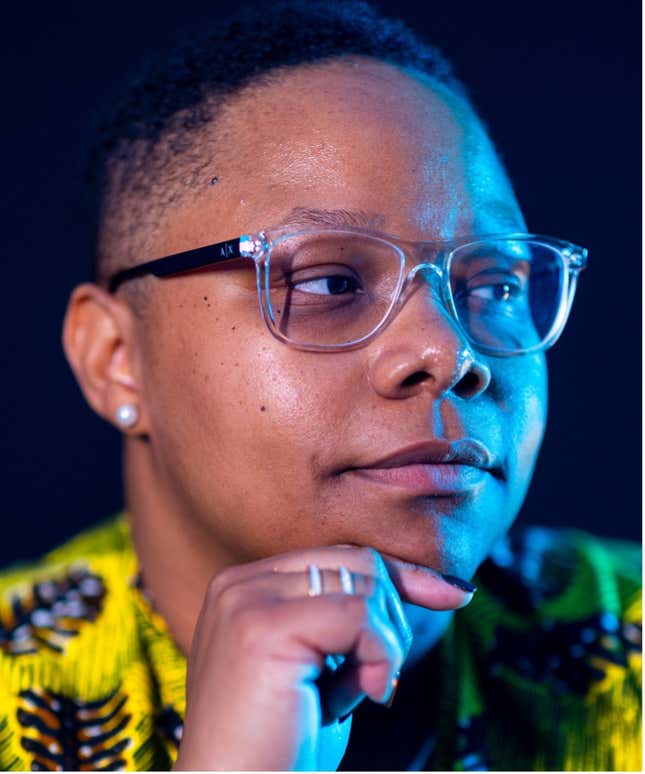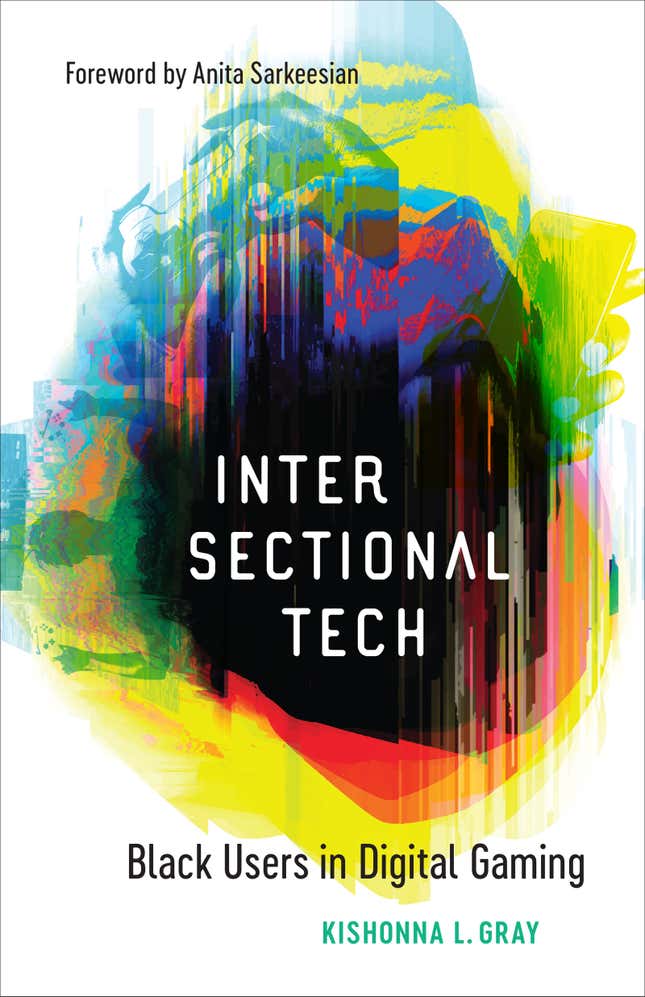This article is part of our new women in gaming series Makers of Now.
During her keynote speech at last year’s ACM CHI Conference on Human Factors in Computing Systems in New Orleans, Dr. Kishonna Gray shared a story about the game Pokémon Go.
She’d just become a professor at the University of Illinois at Chicago, and as someone who studies games and their intersections with factors like gender and race and with Black experience in particular, she was eager to learn about this game that had become such a cultural sensation. She connected with a group of Black teens who agreed to meet her in Grant Park to show her how the game works. However, the young men were rebuffed by security in the area, their numbers and their Blackness disruptive, Gray said, to the white sensibilities of that part of the city. So the teens began heading back home to the predominantly Black neighborhood of Englewood.
Dr. Gray instead headed out to Englewood to meet them. After all, couldn’t Pokémon Go be played anywhere? Wasn’t this one of its selling points, part of what made it so exciting? “I couldn’t have been more wrong,” Gray told the conference. “When I went out there to try to find a [Pokéstop], there were none around.” She shows a slide contrasting a cluster of interactable points in the game in and around Grant Park with the dearth of them in Englewood. Well, okay, she admits, there were not quite none. “There was one,” she says. “It was a statue in the park. And it was a Confederate statue.”
This contrast between the wealth of Pokéstops in one part of Chicago and the near-complete absence of them in another wasn’t just some random fluke, Gray said. It was a game—a hugely popular game, played by millions of people—reflecting disparities in the real world. “There is a racialized legacy of why this is happening,” Gray, an impassioned and charismatic speaker, told the audience. “The legacies of redlining. The legacies of slavery and Jim Crow. Those things are alive and well across our cities…in the United States. They are alive and well.”
Too often, Gray argues, the creators of games and technology ignore these kinds of real-world factors, considering them irrelevant to their work, and because they don’t consciously take them into account, they wind up perpetuating those same disparities in the digital space. People making games “can’t just all of a sudden say, ‘Oh yeah, segregation doesn’t matter because whatever we create will be distributed equally across all populations.’ That’s just not true.” She says companies routinely pay lip service to concepts like diversity and intersectionality, but often fail to actually do the work and have the necessary conversations to avoid replicating real-world inequalities.
Few people are working harder to make gaming and tech more equitable than Dr. Gray herself. Her deep study of issues around race and gender in gaming has led to the publication of several books including Race, Gender, and Deviance in Xbox Live and Intersectional Tech: Black Users in Digital Gaming.
Her writing and academic work in this space is invaluable, and as an intellectual, she can hang with the best of them. Intersectional Tech, for instance, dense with stimulating ideas, begins with talk of “explicat[ing] the possibilities of synthesizing theories and methods from the disciplines of feminism, critical race theory, media studies, and anthropology, among others, in a critical study of black, intersectional technoculture.”
Gaming as a communal act
But don’t make the mistake of thinking that Dr. Gray is a stuffy intellectual. On the contrary, she’s immensely warm, engaging, and approachable, and over Zoom, I asked her about where and how her love of gaming, which has now become so central to her life’s work, began.

Kishonna Gray grew up in a small town in Kentucky, where there were few after-school programs or other activities for a child to occupy herself with. But her mom had a fascination with technology, and so, in her “brilliance and glory, she was like, well, let’s buy video games, so you’ll have something to do.” Because of this, her early experiences with games were wonderfully communal, often fiercely competitive but always within the safety of friends and family. This remained a constant throughout the years, and she fondly recalled how, in the last Christmas she and her siblings shared with her mom before she passed, Mario Kart was part of the time they spent together.
And so her love of games was forged in circumstances blissfully free of the kind of contention and strife that she, as a Black woman in the gaming space, would eventually become only too familiar with.
The new frontiers of Xbox Live
For Dr. Gray, as for myself and many others, Xbox Live was both a gateway to an exciting new frontier in gaming, and our first direct exposure to hateful elements that our gaming had previously been largely free of. In some ways, it was encountering racist, sexist hate in Halo 2 on Xbox Live that set Dr. Gray on the path to studying games so deeply. Why, she wondered, were these people who seemed so invested in spewing hatred there?
“What’s people’s drive and motivation with their play, if they [just] take time out to make it awful for somebody that doesn’t look like them? I was really fascinated by that more than anything,” she told me. “And it wasn’t until I went to graduate school that I realized I could study that, that it could be something that I could do for an academic career.”
As video game culture wars have become the stuff of newspaper headlines, have destroyed lives and impacted national politics, her impulse that this was a space in need of study seems prescient. Looking back, gaming now seems like the canary in the coalmine, she says, in some ways foretelling issues that were later to explode on a more national scale.
Changing the game
Today, Dr. Gray is Associate Professor of Writing, Rhetoric, and Digital Studies at the University of Kentucky. She’s also a highly sought-after consultant, being brought in by game developers and tech designers to help them think through making their games and their platforms more accessible and intersectional. Naturally, the specifics of much of her work as a consultant are under NDA, but when I asked her in broad strokes about how she thinks things are trending, she seemed both hopeful and realistic.

It’s good to see some platforms acknowledging that harassment around factors like race and gender are real things that some users too often have to deal with, she said, pointing to the large-scale hate raids on Twitch a few years back as just one recent manifestation of such harassment. Tools that empower users to respond to and protect themselves from such abuse are perhaps slowly becoming more commonplace, but there remains a sense that cis, white, and male are the default in tech and gaming spaces, and that those of us who don’t fall into these categories are transgressing, opening ourselves up to hostility.
The changes we are seeing, she said, are the result of marginalized people demanding them. But too often they still feel like “nuggets of progress” that are meant to pacify us rather than implement large-scale change to make the world of video games more equitable. That, she said, is going to happen “when the privileged bodies are tired of it, and they really want to operate as allies for us.”
And maybe, just maybe, as games slowly but surely shift, thanks in part to the work of Dr. Gray and other advocates like her, more privileged people will start to see the world a little differently, too, and take up in earnest the cause of dismantling systems of oppression, within both tech and the larger world. Dr. Gray’s keynote concluded with a story about a game jam she attended where she asked participants to design a “decolonial game.” Too often, she argues, the underlying ideology of games unintentionally reflects “continuing the project of white supremacy, continuing genocide and ethnic cleansing, continuing settler colonial models that we can disable and dismantle.”
But when asked to design games that actively resist these ideologies, participants struggled. With so many games fundamentally about taking over spaces or harvesting them for our own gain—something arguably reflected even in the wonderful new game The Legend of Zelda: Tears of the Kingdom, where as Link, you can plunder Hyrule to your heart’s content—how do we make games that challenge such ideas?
“We’ve got to start there,” she said, and as someone who believes that imagining a better world is a necessary step on the path toward creating one, I’m inclined to agree. In games, she suggests, “we can imagine the world to be different, we can create these different worlds, and [they] can be the model for what the world could look like.”

